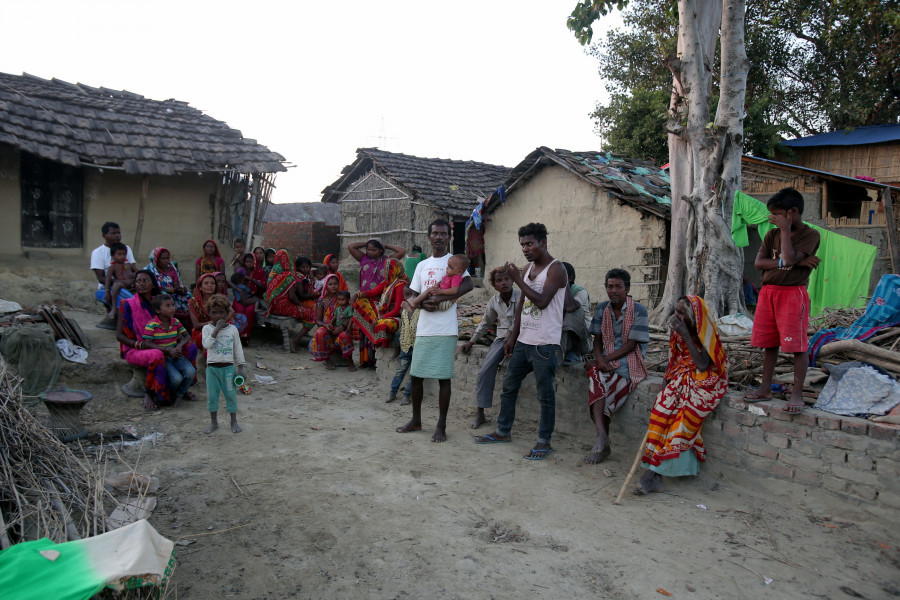National
Discrimination cases got worse during pandemic, Dalit rights advocates say
Incidents of discrimination haven’t decreased due to lax implementation of law, according to national rights body.
Binod Ghimire
As many as 80 cases of caste-based discrimination were reported in 2020, an increase by 50 percent compared to the previous year.
Similarly, there was a sharp rise in the cases of assault and murder of the people from Dalit community with 27 assault and 18 murder cases reported last year, which is over 200 percent more compared to 2019.
Nepal was declared a nation free of caste-based discrimination and untouchability 15 years ago, but the Dalit community continues to suffer from discrimination and hate crime.
Reports by various organisations advocating for Dalit rights show that the people from the community have become more vulnerable to discrimination during the pandemic.
“The crisis impacts the marginalised community the most,” Pradip Pariyar, executive chairperson of Samata Foundation, an organisation advocating for the rights of Dalit community, told the Post. “This was apparent from the experience of Covid-19 pandemic in the first wave and the situation is worsening in the second wave.”
Dalit right activists say an overwhelming number of people from the community experienced discrimination during the pandemic and the problem was even more serious among women.
A survey conducted by the foundation among 1,500 people from the Dalit community showed some 18 percent of them faced discrimination during the pandemic. Similarly, an assessment conducted by Feminist Dalit Organisation showed 48 percent Dalit women experienced the caste-based discrimination last year while 30 percent experienced domestic violence.
People from the Dalit community, who already lacked access to the justice system, were further deprived from justice due to the Covid-19 lockdown.
The National Human Rights Commissions has a similar observation. The constitutional human rights watchdog says despite the constitutional and legal guarantee against caste-based discrimination, incidents of discrimination haven’t decreased due to their lax implementation.
“The cases of murder, assault, torture, social exclusion and denial of state facilities continue against the people from the Dalit community in the lack of effective implementation of the legal shield against such practices,” said Tika Ram Pokharel, spokesperson at the commission. “We are concerned over the impunity in the cases related to caste-based discrimination and untouchability.”
The Constitution of Nepal provides protection against any form of discrimination. Caste Based Discrimination and Untouchability (Offence) Act-2011 and the Criminal Code, which came into effect in 2018, have mad discrimination a punishable offence.
However, the survey of Samata Foundation shows that out of 78 cases of caste-based discrimination reported in the fiscal year 2019/20, only 40 cases were reported to the authority. Moreover, perpetrators were convicted in just 10 percent of the reported cases.
“Complaints from the Dalit community are hardly heard,” Pariyar said. “Even if they are registered, police files weak cases in the court of law leading to a low conviction rate.”
Court proceedings when it comes of cases of discrimination are also slow.
For instance, the district court of Rukum (West) is yet to announce its verdict in the killings of six youths in Soti village of Chaurjahari Municipality in May last year. Although the accused individuals are in judicial custody, the families of the victims are yet to get justice.
Binod Pahadi, a former lawmaker and a Dalit Right activist, says the discriminatory state mechanism is largely responsible for the continued discrimination against Dalits.
“The government has made no attempts to address the concerns of the marginalised communities even when they have been affected the most amid this pandemic,” he told the Post.
The survey by Samata Foundation, which covers the period between March to December last year, also shows that 45 percent of people from the Dalit community faced jobs cuts due to the pandemic. Similarly, nearly 82 percent of the survey participants reported financial distress due to the Covid-19 pandemic and restrictions imposed to contain the virus spread.
There has not been any substantial improvement in the condition of Dalits, like their social status, economic condition, literacy and employment rates, access to land ownership and justice, according to the report by the foundation.
Dalit rights activists say the government must establish a Dalit cell in all police station to look into the cases relating to the community. They also recommend that each districts court should have separate bench so that the cases related to caste-based discrimination and untouchability are swiftly decided.
Dalit rights activists have also called for formation of monitoring committees in all national human right institutions to monitor cases of caste-base discrimination.
“Government’s responsibility should not be limited to issuing reports and statements,” Pahadi said. “It should walk the talk, work proactively towards ending all forms of discrimination.”




 20.12°C Kathmandu
20.12°C Kathmandu














